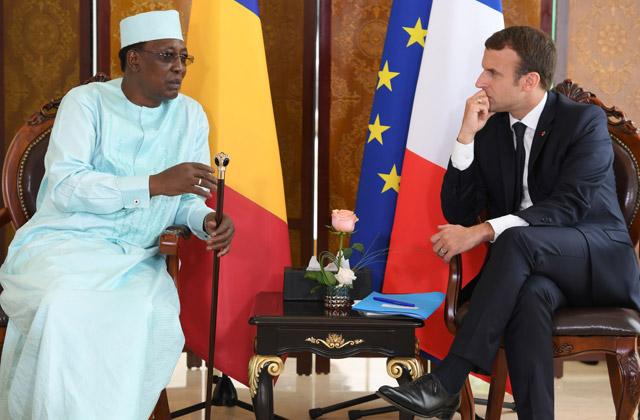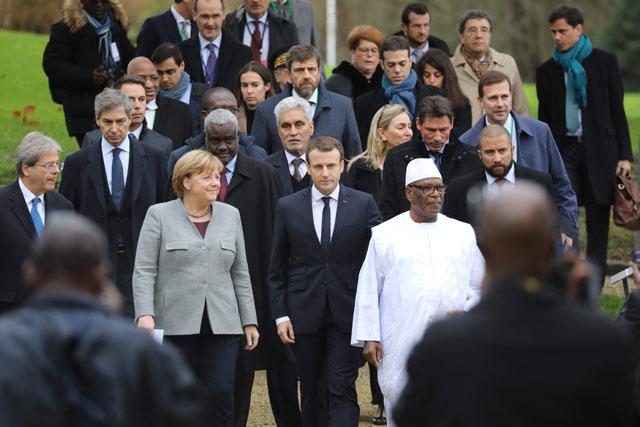You are here
Sahel summit appeal to step up fight against militants
By AFP - Feb 26,2020 - Last updated at Feb 26,2020
NOUAKCHOTT — A summit of Sahel countries heard appeals on Tuesday to step up the fight against militants whose offensive across three countries has claimed thousands of lives and inflicted crippling economic damage.
“More than ever, the Sahel requires heightened and coordinated attention from states in the region and the international community to brake the spiral of violence,” said Mauritanian President Mohamed Ould Cheikh El Ghazouani, chairing a one-day summit of the so-called G-5 Sahel group.
“We urgently need concrete victories against terrorism. The real challenge of this summit is to meet this existential need,” said the chair of the African Union’s commission, Moussa Faki Mahamat.
He said civilians in the Sahel were bewildered by the failure to stop the violence.
He called for a “step change” in implementing a much-touted 5,000-man joint force by the G-5 Sahel countries, and for “more substantial” support from other African countries.
The G-5 Sahel comprises Burkina Faso, Chad, Mali, Mauritania and Niger, whose region is in the front line of a nearly eight-year-old onslaught by armed extremist fighters.
A localised revolt that began in northern Mali in 2012 has spread to the centre of the country and to neighbouring Burkina Faso and Niger.
Around 4,000 people died in the three countries last year, a five-fold increase over 2016, according to UN figures.
The bloodshed has escalated despite the presence of a 13,000-man UN peacekeeping force in Mali, and rattled coastal countries to the south of the Sahel.
‘Unprecedented humanitarian crisis’
Burkina President Roch Marc Christian Kabore on Tuesday warned that the Sahel faced an “unprecedented humanitarian crisis”.
France — which has committed more than 4,000 troops to holding back militants in the Sahel — added on Tuesday to demands for action.
“I am here with you to say that a surge in mobilisation, coordination or prioritisation is necessary,” French Foreign Minister Jean-Yves Le Drian told the summit.
He said the meeting in the Mauritanian capital was considered by France to be a key phase in implementing decisions made at a France-Sahel summit last month.
Despite “frustrations” among Sahel leaders, “we cannot deny the ground that we have covered since 2014”, he said.
Since the January summit in Pau, southwestern France, “major progress has been achieved in a month”, Le Drian said.
He pointed to the deployment of so-called “reconstituted” units in the Malian army that include former rebels and the recently-announced arrival in the near future of a Chadian battalion in the badly-hit region where the borders of Burkina, Malia and Niger come together.
Le Drian also noted France’s announcement on February 2 to bolster troop numbers in its Operation Barkhane in the Sahel from 4,500 to 5,100; the supply of European military equipment; and the creation of a joint headquarters in Niamey, the capital of Niger.
The G-5 Sahel group was launched in 2014, with a secretariat based in Nouakchott.
In 2017, the five countries initiated a planned 5,000-man pooled force, but it remains hobbled by lack of funds, poor equipment and inadequate training.
Security worries in the Sahel have also been sharpened by Pentagon plans, which have yet to be detailed, to draw down the US military presence in Africa.
Before the summit, Le Drian chaired the first general assembly of the so-called Sahel Alliance, set up in 2017 to muster international development aid.
Pledges amount to 11.6 billion euros ($12.61 billion), Le Drian said.
“The chief question is... how to spend [the money] on concrete projects that help the people of the Sahel,” Le Drian said.
Related Articles
BAMAKO — French President Emmanuel Macron on Sunday threw his weight behind a planned Sahel force to fight extremists on a lightning visit t
BAMAKO — A five-nation force set up to roll back terrorism in the Sahel has carried out a military operation for the first time in months, a
PARIS — French President Emmanuel Macron hosts Germany's Angela Merkel and five African presidents on Wednesday, hoping to bolster the fledg


















